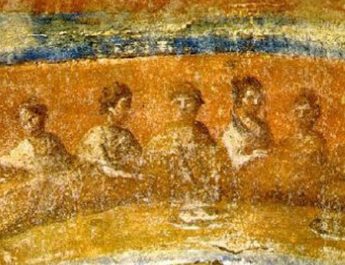Psalm 22:23-31
A Women’s Lectionary 35
23 You who fearA the Lord,B praiseC him!
A “fear” = yare. This is to fear, be afraid, dreadful. It can also refer to fearful reverence – to fear in a moral sense is to say to revere, respect.
B “Lord” = YHVH. From havah (to be, become) or hayah (to come to pass, become, be). This is the name of the God of Israel, the self-existent and eternal one, the tetragrammaton. This pronunciation has been lost to time so “Lord” is generally used in its place.
C “praise” = halal. This is to be clear – it originally referred to a sound, then a color. It was to shine and then make a show or boast then to rave. In a causative sense it came to mean celebrate, give glory, sing praise, or be worth of praise. Because of the celebratory nature of the word, it could also mean to give in marriage. This is where Hallelujah comes from.
AllD you offspringE of Jacob,F glorifyG him;
stand in aweH of him, all you offspring of Israel!I
D “all” = kol. This is all or every.
E “offspring” = zera. From zara (to sow or scatter seed; conceive or yield). This is seed or sowing. It can, thus, mean a fruit, plant, sowing time, child, offspring, or posterity.
F “Jacob” = Yaaqob. From the same as aqeb (heel, hind part, hoof, rear guard of an army, one who lies in wait, usurper). This is Isaac’s son and his descendants. The name means heel-catcher or supplanter.
G “glorify” = kabad. To be heavy, weighty, or severe. It can also be positive abounding in, rich, or honorable. The Hebrew word for “glory,” kabod, is taken from this root.
H “stand in awe” = gur. Properly, this is the act of turning off the road for any reason. So, it means sojourning, becoming a guest. It can mean being fearful since one is outside of home territory. It can also mean dwelling, living, or inhabiting if one has turned off the root to encamp for a longer duration. This word is where the Hebrew “ger” comes from, which is the word translated “stranger” or “resident alien.”
I “Israel” = Yisrael. From sarah (to persist, exert oneself, contend, persevere, wrestle, prevail) + el (God or god). This is Israel, meaning God strives or one who strives with God; new name for Jacob and for his offspring. This refers to the people and to the land.
24 For he did not despiseJ or abhorK
the afflictionL of the afflicted;M
J “despise” = bazah. This is to despise, hold in contempt, disesteem, or a person who is vile.
K “abhor” = shaqats. 7x in OT– 4x for regarding as detestable unclean foods or things, 2x of making yourself detestable with unclean animals, 1x for God not abhorring the affliction of the afflicted. From sheqets (detestation, detestable thing, filth. Can be used for an idolatrous object). This is to detest, make detestable, abhor; to be filth, loathe, pollute.
L “affliction” = enuth. 1x in OT. From anah (to defile, be bowed down, be afflicted; looking down; to depress literally or figuratively). This word is affliction.
M “afflicted” = ani. Related to “affliction” in v24. From anah (see note L above). This is humble, lowly, poor, or afflicted.
he did not hideN his faceO from me
but heardP when I criedQ to him.
N “hide” = sathar. This is hide, conceal, or be absent. It is hiding because something is covered – used in a literal or figurative sense.
O “face” = paneh. From panah (to turn, face, appear). This is face in a literal or figurative sense. It could be face, presence, anger, respect. It can also be used of God to indicate divine favor or presence.
P “heard” = shama. This is to hear, call, consent, or consider. It implies listening intelligently, giving attention, and, because of these two factors, obedience and action are often implied.
Q “cried” = shava. This is crying or shouting aloud, generally seeking freedom from some kind of trouble.
25 From you comes my praiseR in the greatS congregation;T
R “praise” = tehillah. Related to “praise” in v23. From halal (see note C above). This is praise or a song of praise. It is to offer God a hymn, to boast in God. This shares a root with “hallelujah.”
S “great” = rab. From rabab (increasing in any aspect whether quantity, authority, size, quality, greatness, etc.). This is abundance, many, elder, exceedingly, great. It refers to abundance of amount, rank, or status.
T “congregation” = qahal. This is an assembly, congregation, or multitude.
my vowsU I will payV beforeW those who fear him.
U “vows” = neder. From nadar (to vow or promise). This is a vow – literally, that which was promised.
V “pay” = shalam. This is to be complete or sound – to have safety mentally, physically, or extending to one’s estate. So, if these things are safe and complete, the implication is that one would be friendly; and, if being friendly, one would make amends and that friendship would be reciprocated. This is the root verb that “shalom” comes from, the Hebrew word for peace.
W “before” = neged. From nagad (to declare, make conspicuous, stand in front, manifest, predict, explain). This is in front of, opposite to. It can refer to a counterpart or partner, one corresponding to or in the sight of.
26 The poorX shall eatY and be satisfied;Z
those who seekAA him shall praise the Lord.
X “poor” = anav. Related to “affliction” and “afflicted” in v24. From anah (see note L above). This is poor, needy, afflicted as well as humble or meek.
Y “eat” = akal. This is to eat, devour, burn up, or otherwise consume. It can be eating in a literal or figurative sense.
Z “be satisfied” = saba. To be satisfied or full in a literal or figurative sense. Also, to have plenty of.
AA “seek” = darash. This is seek, ask, inquire, care for. Generally, it means following in pursuit or following as part of a search, which implies seeking or asking. Also used specially to mean worship.
May your heartsBB liveCC forever!DD
BB “hearts” = lebab. May be related to labab (to encourage; properly, to be encased as with fat; used in a good sense, this means to transport someone with love; used in a bad sense, it can mean to dull one’s senses). This is the heart, courage, one’s inner self, the mind, or the will. Heart is only used in a figurative sense in the Old and New Testaments.
CC “live” = chayah. This is to live or keep alive in a literal or figurative sense. So, it can be revive, nourish, or save.
DD “forever” = ad. From adah (to advance or continue; to take away or remove; adorning oneself with ornaments). This is old, perpetuity, eternity. It is a duration going back or forward.
27 All the endsEE of the earthFF shall rememberGG
and turnHH to the Lord,
EE “ends” = ephes. From aphes (to finish, fail, stop, come to nothing, disappear). This is an end, ceasing, no further. It is often used to refer to the ends of the earth.
FF “earth” = erets. Root may mean to be firm. This is earth, ground, field land, or country.
GG “remember” = zakar. This is to remember, to mark something so that it can be recalled, to be mindful of, to mention.
HH “turn” = shub. To turn back, return, turn away – literally or figuratively. Doesn’t necessarily imply going back to where you started from. This is also the root verb for the Hebrew word for repentance “teshubah.”
and all the familiesII of the nationsJJ
shall worshipKK beforeLL him.
II “families” = mishpachah. From the same as shiphcah (maid, maidservant); root means to spread out. This is one’s circle of relatives – clan, family, kindred.
JJ “nations” = goy. From the same root as gevah (the back, person, or body); related to gev (among); related to gaah (to rise up). This is nation or people. Often used to refer to Gentiles or foreign nations. It can also be used figuratively for a group of animals. This is where the Yiddish “goy” comes from.
KK “worship” = shachah. This is to bow down, make a humble entreaty, to do homage to royalty or to God.
LL “before” = paneh. Same as “face” in v24. See note O above.
28 For dominionMM belongs to the Lord,
and he rulesNN over the nations.
29 To him, indeed, shall allOO who sleepPP in the earth bow down;QQ
MM “dominion” = melukah. From the same as melek (king). This is kingship, kingdom, reign. It can also mean royalty.
NN “rules” = mashal. This is to rule, reign, govern, have authority, wield.
OO {untranslated} = dashen. 3x in OT. From dashen (to be fat or anointed, to be fattened; to remove ashes from; figuratively, to enrich, satisfy). This is fat, rich, or fertile.
PP “sleep” = akal. Same as “eat” in v26. See note Y above.
QQ “bow down” = shachah. Same as “worship” in v27. See note KK above.
beforeRR him shall bowSS all who go downTT to the dust,UU
and IVV shall live for him.
RR “before” = paneh. Same as “face” in v24. See note O above.
SS “bow” = kara. This is to bow, crouch, kneel down, subdue. It is to bend the knee in many senses. It can also mean to smite, a woman crouching in childbirth, or bowing to worship God.
TT “go down” = yarad. This is to go down, descend; going down in a literal or figurative sense. It can be going to the shore or a boundary, bringing down an enemy.
UU “dust” = aphar. May be related to aphar (to throw dust, be dust). This is dust as powdered, perhaps gray colored. It could be ashes, powder, ground, dry earth, clay mud, or rubbish.
VV “I” = nephesh. Related to naphash (to refresh or be refreshed). This is soul, self, person, emotion. It is a breathing creature. Can also refer to appetites and desires.
30 PosterityWW will serveXX him;
future generationsYY will be toldZZ about the LordAAA
WW “posterity” = zera. Same as “offspring” in v23. See note E above.
XX “serve” = abad. This is to work, serve, or compel. It can describe any kind of work or service (including religious devotion). Also, till or cultivate. Used causatively, it can mean to enslave or keep in bondage.
YY “future generations” = dor. From dur (to move in a circle, which implies living somewhere or remaining there; it can also be the sense of piling or heaping up). This is a revolution of time, which is to say, an age or generation. It can also be a dwelling or one’s posterity.
ZZ “told” = saphar. From sepher (writing, document, book, evidence). This is properly to tally or record something. It can be enumerate, recount, number, celebrate, or declare.
AAA “Lord” = Adonai. From adon (lord, master, owner); root means to rule or be sovereign. This is the actual Hebrew word for Lord used (in a different form) of humans and (in the present form) of God. It means someone who is in control.
31 andBBB proclaimCCC his deliveranceDDD to a peopleEEE yet unborn,FFF
saying that he has doneGGG it.
BBB {untranslated} = bo. This is to enter, come in, advance, fulfill, bring offerings, enter to worship, attack. It can also have a sexual connotation.
CCC “proclaim” = nagad. Related to “before” in v25. See note W above.
DDD “deliverance” = tsedaqah. From the same as tsedeq (rightness, righteousness, vindication. It is everything that is just or ethical. That which is right in a natural, moral, or legal sense. It also includes just weights (i.e. true weights). Figuratively, this is justice, righteousness, equity – even prosperity). This is righteousness, justice, righteous acts, and moral virtue.
EEE “people” = am. From amam (to darken, hide, associate; creating shadows by huddling together). This is people or nation. It can be used specifically for a tribe, collectively of troops or armies, or figuratively to refer to a flock of animals.
FFF “unborn” = yalad. This is to bear or bring forth. It can mean to act as midwife or to show one’s lineage. This is often used for birth or begetting.
GGG “done” = asah. This is to make, do, act, appoint, become in many senses.
Image credit: “Light Shower” by Derek Bruff, 2013.




